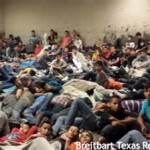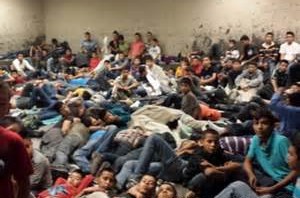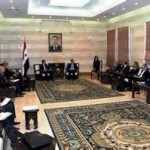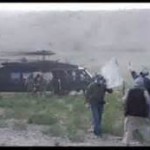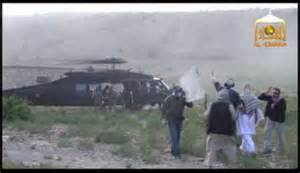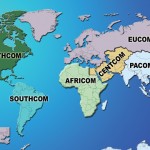All dedicated patriots across America have questioned the loyalty of Barack Obama and those past and present in his administration. Much has been written challenging his allegiance to what really is America and what she stands for.
Perhaps it would be a good time for reference purposes to list some profound work by others that have worked diligently to teach the undisputed facts.
Frank Gaffney offers a course that requires you to enroll.
Clare Lopez spells out the history of the Muslim Brotherhood in the U.S. government.
Robert Spencer and David Horowitz published a short book providing tangible evidence of Barack Obama’s outside loyalties.
Andrew McCarthy accomplished prosecutor and author spells out Barack Obama’s Sharia agenda.
While America has listed proven enemies that include al Qaeda, Muslim Brotherhood and Hamas, it is important to pull back the curtains now on the recent Taliban 5 release from Gitmo and what role Qatar played. Below are the reasons why we cannot trust Barack Obama, his inner circle but most especially Qatar to control the Taliban 5.
Of particular note is an organization called the Union of Good. The deep relationship that has ties inside the United States and spreads to other global destinations that includes Qatar. There are countless members of the Obama administration that were/are involved with Qatar and the Muslim Brotherhood/Hamas and the back-channels of al Qaeda, including previous Secretary of the Department of Homeland Security, Janet Napolitano. She willingly agreed to Barack Obama’s edict to cooperate with Qatar.
This is chilling and a warning for Americans located anywhere in the world, with particular attention to our soldiers that proudly display the American flag on their shoulders.
Qatar, at the core of Barack Obama’s hidden loyalty.
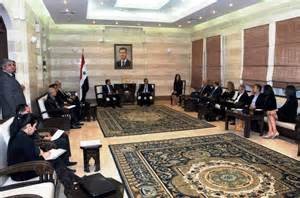
Following joint military operations during Operation Desert Storm in 1991, Qatar and the United States concluded a Defense Cooperation Agreement that has been subsequently expanded. In April 2003, the U.S. Combat Air Operations Center for the Middle East moved from Prince Sultan Airbase in Saudi Arabia to Qatar’s Al Udeid airbase south of Doha, the Qatari capital. Al Udeid and other facilities in Qatar serve as logistics, command, and basing hubs for the U.S. Central Command (CENTCOM) area of operations, including Iraq and Afghanistan. In spite of serving as the host to a large U.S. military presence and supporting U.S. regional initiatives, Qatar has remained mostly secure from terrorist attacks. Terrorist statements indicate that energy
infrastructure and U.S. military facilities in Qatar remain potential targets. U.S. officials have described Qatar’s counterterrorism cooperation since 9/11 as significant; however, some observers have raised questions about possible support for Al Qaeda and other violent extremist groups by some Qatari citizens, including members of Qatar’s large ruling family.
Qatari officials have taken an increasingly active diplomatic role in recent years, seeking to position themselves as mediators and interlocutors in a number of regional conflicts. Qatar’s deployment of fighter jets and transport planes to support NATO-led military operations in Libya signaled a new assertiveness, as have Qatari leaders’ calls for providing weapons to the Syrian opposition. Qatar’s willingness to embrace Iran, Hezbollah, Hamas, and the Taliban as part of its mediation and outreach initiatives has drawn scrutiny from some U.S. observers. Unrest in Syria and Hamas-Fatah reconciliation attempts have created challenging choices for Qatar, and Qatari leaders now host Hamas leader Khaled Meshaal following his split with the Asad regime. The Obama Administration has not voiced public concern about Qatar’s multidirectional foreign policy and has sought to preserve and expand military and counterterrorism cooperation with the ambitious leaders of this wealthy, strategically located country.
The emir visited Washington, DC, in April 2011 for consultations with President Obama and congressional leaders. In the wake of the visit, U.S. Ambassador to Qatar Joseph LeBaron referred to “a deepening of the relationship in political terms” and stated his belief that President Obama’s consultation with Shaykh Hamad moved the U.S.-Qatari relationship “in a direction that is qualitatively different from the past 10 years.”2 The Administration has not elaborated on what new political arrangements or agreements, if any, were concluded during the emir’s visit. In the months since, Qatar has continued its bold responses to unrest in various Arab countries by backing opposition movements in Libya and Syria and offering sanctuary to Hamas leader Khaled Meshaal after his departure from Damascus.
Multilateral diplomacy aimed at ending the insurgency in Afghanistan entered a new phase in late 2011, culminating in an announcement by the Afghan Taliban that the movement is ready to open a political office in the Qatari capital, Doha, to engage with third parties.3 The announcement signaled a formal return to the international diplomatic stage by the Taliban, which operated embassies in Saudi Arabia and the United Arab Emirates prior to its ouster by U.S.-backed Afghan militias in 2001. Qatari Prime Minister and Foreign Minister Hamad bin Jassem bin Jabr Al Thani has said, “A solution in Afghanistan requires the participation of the Taliban in a way that must be decided by the Afghans. That requires talking to them.”4 The Doha office was part of a package of U.S. proposals for confidence building measures with the Taliban; Afghan authorities reportedly had preferred Saudi Arabia or Turkey as a proposed site for the office, presumably out of concern that Qatar might not adequately monitor or limit the activities of senior Taliban personnel.
Afghanistan withdrew its ambassador from Doha for consultations in mid-December 2011, in apparent protest of what it implied were Qatari efforts to circumvent Afghan government participation in discussions concerning the proposed office and a negotiated settlement to the conflict. The Afghan ambassador returned to Doha in early 2012, in line with Afghan President Hamid Karzai’s acceptance of the Doha office concept. Still, Karzai has insisted that his government remain fully involved in all aspects of any negotiations, in Doha or elsewhere.
Afghan Foreign Minister Dr. Zalmai Rassoul visited Doha in early April 2012 and said that Qatar and the United States can help Afghans negotiate peace by “providing the appropriate environment for success,” but such peace talks should be “between Afghans.” Rassoul told the April 22 NATO Foreign and Defense Ministers Meeting in Brussels that, “we’re today closer to the opening of an address in Qatar for the purpose of facilitating direct negotiations between the Afghan government and the Taliban and other armed opposition groups than at any other point in the past. We hope to finalize an understanding on this in Kabul soon.
Qatar has supported the Arab League position backing internationally supported negotiations between the Palestinian Authority and Israel.6 In April 2011, Shaykh Hamad bin Khalifa said during a visit to the White House that “the most important issue for us in the region is that Palestine-Israeli conflict and how to find a way to establish a Palestinian state.” He signaled his support for President Obama’s goal of “supporting the existence of two states peacefully living side by side.” Qatari leaders also have criticized recent Israeli decisions on settlements and Jerusalem that they feel undermine prospects for a two-state solution. Qatar has been in the forefront of Arab-Israeli talks on expanding economic ties during periods of progress in the peace process. However, Qatar’s position regarding the Arab boycott of Israel is governed by the September 1994 decision by the GCC to terminate enforcement of the indirect boycotts, while maintaining, at least in theory, the primary boycott. An Israeli trade office in Doha was shuttered by the Qatari government in response to the January 2009 Gaza war and has not been reopened.
Qatar offered $50 million in financial support to the then-Hamas-led Palestinian Authority government and has hosted Hamas officials for numerous talks and consultations since January 2006. Israel’s then-Foreign Minister Tzipi Livni declined a Qatari invitation to participate in an October 2006 democracy conference in Doha because of the presence of Hamas representatives, but an Israeli delegation participated in the conference, led by lower-ranking Foreign Ministry officials.8 Israeli Deputy Prime Minister Shimon Peres visited Qatar in February 2007 and declined the emir’s reported suggestion that Israel negotiate directly with Hamas.
Some observers speculate that Qatar may be encouraging Libyan militia groups to provide weaponry or volunteers to support counterparts in the Syrian opposition. Qatari leaders have called for Syrian rebels to be armed, but no public confirmation of any connection to Libya has been established.
Qatar has pursued a policy of engagement with Iran in recent years, probably based on the countries’ shared energy reserves and Qatar’s calculation that engagement may help deter Iranian reprisal attacks on U.S. and Qatari targets in the event of any regional conflict involving Iran.
Qatari and Iranian officials signed a defense and security cooperation agreement in February 2010, and, in April 2010, Qatari military officers reportedly were invited to observe Iranian military drills in the Persian Gulf. In February 2010, Qatari Prime Minister Hamad bin Jassem bin Jabr Al Thani reportedly encouraged the United States to engage directly with Iran in order to resolve the ongoing dispute over Iran’s nuclear program.
In early 2011, Qatar attempted to resolve a government crisis in Lebanon and was rebuffed by Hezbollah and its Syrian and Iranian supporters. This precipitated the fall of the government of then-Prime Minister Saad Hariri and paved the way for a more confrontational Qatari approach to its relations with the government of President Bashar al Asad in Damascus. During the Syrian uprising, Qatar has taken an increasingly direct approach to insisting on a halt to violence against protestors, organizing multilateral Arab sanctions on Syria while quietly lending political support to opponents of Asad’s regime.
A U.S. embassy opened in Doha in 1973, but U.S. relations with Qatar did not blossom until after the 1991 Persian Gulf war. In the late 1980s, the United States and Qatar engaged in a prolonged diplomatic dispute regarding Qatar’s black market procurement of U.S.-made Stinger anti-aircraft missiles.
The United States has provided limited counterterrorism assistance to Qatar to support the development of its domestic security forces (see Table 2 below), and the Export-Import Bank has provided over $2 billion in loan guarantees to support various natural gas development projects in Qatar since 1996. The Obama Administration has phased out limited U.S. foreign assistance and in recent years has requested military construction funds for facilities in Qatar. Since September 2005, Qatar has donated $100 million to victims of Hurricane Katrina in the U.S. Gulf states.
According to the 9/11 Commission Report and former U.S. government officials, royal family member and current Qatari Interior Minister Shaykh Abdullah bin Khalid Al Thani during the 1990s provided safe harbor and assistance to Al Qaeda leaders, including the suspected mastermind of the September 11 hijacking plot, Khalid Shaykh Mohammed.39 Several former U.S. officials and leaked U.S. government reports state that the late Osama Bin Laden also visited Doha twice during the mid-1990s as a guest of Shaykh Abdullah bin Khalid, who served then as Qatar’s minister for religious endowments and Islamic affairs, and later as minister of state for internal affairs.40 According to other accounts, Shaykh Abdullah bin Khalid welcomed dozens of so-called “Afghan Arab” veterans of the anti-Soviet conflict in Afghanistan to Qatar in the early 1990s and operated a farm where some of those individuals lived and worked over a period of several years.41
In January 1996, FBI officials narrowly missed an opportunity to capture Khalid Shaykh Mohammed in Qatar, where he held a government job at Qatar’s Ministry of Electricity and Water. Mohammed had been targeted for arrest in connection with an investigation of his nephew—1993 World Trade Center bombing mastermind Ramzi Yousef.42 The FBI dispatched team to arrest Mohammed, but he fled Qatar before he could be detained. Some former U.S. officials have since stated their belief that a high-ranking member of the Qatari government alerted Mohammed to the impending raid, allowing him to flee the country.
During the summer 2006 Israel-Hezbollah war and 2008-2009 Israel-Hamas war, Qaradawi publicly argued that Muslims should support the activities of Hezbollah and Hamas as legitimate resistance activities, based on Quranic injunctions to defend Muslim territory invaded by outsiders.55 Qaradawi hosts a popular weekly call-in television show on Al Jazeera and frequently delivers sermons in Qatari mosques.
Qaradawi has worked with a charitable umbrella organization, known as the Union of Good, that coordinates the delivery of relief and assistance to Palestinians in the West Bank and Gaza Strip.
In November 2008, the U.S. Department of the Treasury designated the Union of Good as a financial supporter of terrorism pursuant to Executive Order 13224. According to the Treasury, “The Union of Good acts as a broker for Hamas by facilitating financial transfers between a web of charitable organizations—including several organizations previously designated under E.O. 13224 for providing support to Hamas—and Hamas-controlled organizations in the West Bank and Gaza.”56 Qaradawi has appeared at public events in Doha with Hamas leader Khaled Meshaal since Meshaal’s relocation to Doha in early 2012.
Full text of this Congressional report with the citations is found here.
The core of the Barack Obama foreign policy carried out by Hillary Clinton and John Kerry with the help of Susa Rice, Samantha Power, along with foreign investments, donated monies and actions by USAID is now fully explained.
Clearly, this explains how the Taliban 5 are enjoying their new country-club setting and the revolving door of nefarious visitors and cards and letters of joy are now being exchanged.
National Security has been sacrificed at the hands of Barack Obama, who told us he is un-apologetic. The Altar of Treason, explained.

